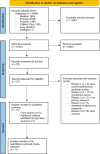Non-affective psychotic disorders and risk of dementia: a systematic review and meta-analysis
- PMID: 36200264
- PMCID: PMC9772917
- DOI: 10.1017/S0033291722002781
Non-affective psychotic disorders and risk of dementia: a systematic review and meta-analysis
Abstract
Non-affective psychotic disorders have been associated with an increased risk of developing dementia. However, research in this area remains limited, highlighting the need for an up-to-date systematic review and meta-analysis of the evidence. We aimed to systematically review and quantify the risk of dementia associated with psychotic disorders. We searched four electronic databases for longitudinal studies investigating non-affective psychotic disorders and subsequent dementia. We used random-effects meta-analyses to pool estimates across studies and assessed risk of bias for each study. Non-affective psychotic disorders were associated with increased risk of all-cause dementia; pooled risk ratio (RR) = 2.52, 95% confidence interval (CI) (1.67-3.80), I2 = 99.7%, n = 12,997,101; 11 studies, with high heterogeneity between studies. Subgroup analyses indicated stronger associations in studies with shorter follow-up periods, conducted in non-European countries, published after 2020, and where ≥60% of the sample were female. The risk was higher in people aged <60 years at baseline, in typical and late-onset psychotic disorders versus very late-onset psychosis, in broader psychotic disorders vs schizophrenia, and in prospective vs retrospective studies. Associations remained after excluding low quality studies (pooled RR = 2.50, 95% CI (1.71-3.68), I2 = 99.0%). Our review finds a substantial association between psychotic disorders and subsequent dementia. Our findings indicate that psychotic disorders are a potentially modifiable risk factor for dementia and suggest that individuals with psychotic disorders need to be closely monitored for cognitive decline in later life. Further research is needed to investigate the mechanisms underlying the association between psychotic disorders and dementia.
Keywords: Dementia; Meta-analysis; Non-affective psychotic disorders; Risk; Systematic review.
Figures
References
-
- American Psychiatric Association. (2013). Diagnostic and statistical manual of mental disorders (5th ed.). Arlington, VA: American Psychiatric Association.
-
- Blacker, D., Albert, M. S., Bassett, S. S., Go, R. C., Harrell, L. E., & Folstein, M. F. (1994). Reliability and validity of NINCDS-ADRDA criteria for Alzheimer's disease: The national institute of mental health genetics initiative. Archives of Neurology, 51(12), 1198–1204. doi: 10.1001/archneur.1994.00540240042014 - DOI - PubMed
Publication types
Grants and funding
LinkOut - more resources
Full Text Sources



